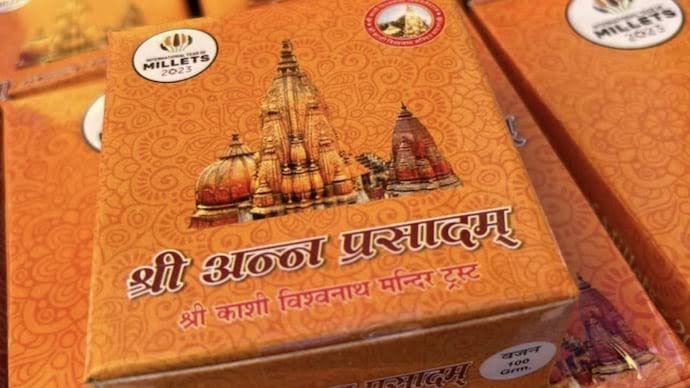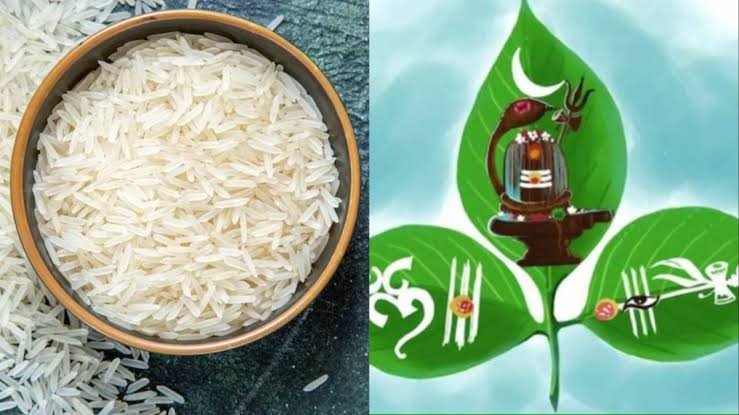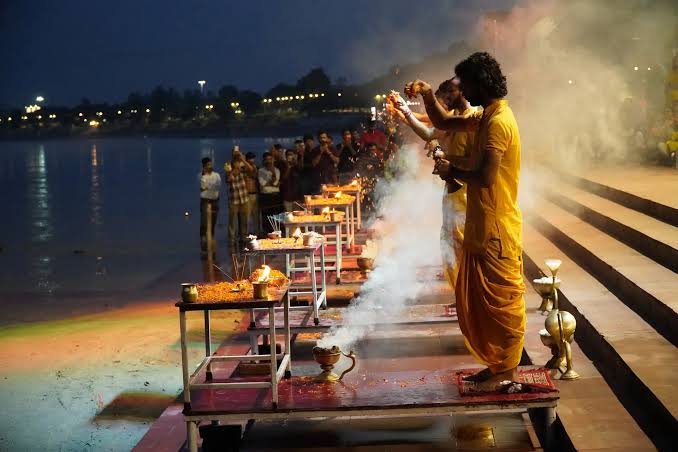Introduction: A Sacred Shift in Kashi’s Prasadam Tradition
In the ancient city of Kashi (Varanasi), one of the most spiritually significant places in India, a profound transformation is taking place within the Kashi Vishwanath Temple, dedicated to Lord Shiva. Starting today, the temple will introduce a new type of prasadam, a holy offering blessed by the deity and shared with devotees as a token of divine grace. The temple management has chosen to elevate the sanctity of the prasadam by changing its ingredients and preparation method, drawing on the profound connection between spiritual rituals and Hindu scriptures.

The new prasadam, crafted from rice flour and the sacred belpatra (leaves of the bael tree), has been meticulously developed following months of study and consultation with scholars of Hindu scripture. The inclusion of belpatra, which has long been associated with the worship of Lord Shiva, and rice flour, a symbol of abundance and purity, represents a thoughtful fusion of spiritual tradition and cultural reverence. What makes this prasadam especially significant is its preparation by a select group of Hindu artisans, ensuring that every aspect of its creation adheres to strict religious practices.
This shift is set to begin on the auspicious occasion of Vijayadashami, when the new prasadam will first be offered to Lord Vishwanath (another form of Lord Shiva), before being made available to devotees through stalls within the temple premises. This transition is not only a celebration of Kashi’s rich spiritual heritage but also a conscious move toward ensuring that the prasadam remains a pure and sanctified offering.
The Role of Prasadam in Hinduism: A Sacred Offering
Prasadam holds immense significance in Hindu rituals and temple traditions. It is not merely food, but a sacred offering that has been blessed by the deity after being presented during prayers. Devotees view prasadam as a means of receiving divine grace, and temples across India distribute their own unique versions of this holy food, often reflective of local customs, agricultural produce, and historical traditions.
At the Kashi Vishwanath Temple, prasadam holds special reverence, as it is considered an embodiment of the blessings of Lord Shiva. Pilgrims from all over the country and the world visit Kashi to offer prayers to Baba Vishwanath, and receiving prasadam from this temple is considered a sacred ritual. The temple’s decision to modify the prasadam recipe marks a new chapter in this age-old tradition, but one that remains deeply rooted in religious and cultural significance.
The Scriptural Basis for the New Prasadam Recipe
The introduction of the new prasadam was not a decision made lightly. A team of scholars and temple authorities undertook a thorough examination of Hindu scriptures, including the Vedas, Puranas, and other religious texts, to determine the most appropriate ingredients and methods for preparing this sacred offering. Their research led to the decision to use rice flour, which is mentioned in ancient texts as a staple offering to deities, and belpatra, which has long been revered in the worship of Lord Shiva.

Rice has a deep cultural connection in India, as it is one of the country’s most important crops and is symbolic of fertility, prosperity, and abundance. In Hindu mythology, rice is often associated with divine blessings, and its use in religious offerings has been documented for centuries. In the Mahabharata, rice plays a pivotal role in the story of Sudama, who offered it to Lord Krishna as a humble gift, only to be showered with riches in return. This connection between rice and divine grace makes it a fitting choice for the new prasadam.
Belpatra, the leaves of the bael tree, holds even greater significance in the context of Lord Shiva worship. According to Hindu tradition, offering belpatra to Lord Shiva is considered one of the most auspicious acts a devotee can perform. The bel tree itself is believed to have originated from the sweat of Goddess Parvati, Lord Shiva’s consort, and its leaves are thought to possess purifying properties that please the deity. By including belpatra in the new prasadam, the temple has ensured that the offering carries a spiritual significance that aligns with the rituals of Shiva worship.
Preparation by Hindu Artisans: Upholding Tradition and Purity
One of the most unique aspects of the new prasadam is the temple’s strict adherence to traditional Hindu practices in its preparation. The Kashi Vishwanath Temple has specified that only Hindu artisans will be allowed to prepare the prasadam, a decision rooted in the belief that those involved in the creation of sacred offerings should share the religious beliefs and spiritual practices that govern the temple.
The artisans who have been chosen to prepare the prasadam must follow strict religious protocols. Before beginning their work, they are required to purify themselves by bathing, as cleanliness and purity are essential aspects of preparing prasadam. This emphasis on purity is not just physical but also spiritual, ensuring that the food being offered to Lord Vishwanath is prepared with the utmost devotion and reverence.
The involvement of these artisans also ensures that the prasadam is prepared in accordance with religious guidelines and ancient traditions. By entrusting the preparation to individuals who are intimately familiar with the rituals and customs of Hindu worship, the temple guarantees that the sanctity of the prasadam is preserved at every stage of its creation.
Amul’s Role: Ensuring Quality and Authenticity
In an interesting development, the responsibility for producing the new prasadam has been assigned to Amul, one of India’s most trusted and well-known dairy cooperatives. Amul’s involvement is a testament to the temple’s commitment to maintaining the highest standards of quality and safety in the preparation of its prasadam. The company, known for its stringent quality control measures and adherence to food safety standards, has been entrusted with producing the prasadam in line with the temple’s specifications.

Amul has already completed the production of a ten-day supply of the new prasadam, following the strict guidelines provided by the Kashi Vishwanath Temple. This prasadam has been certified by national and international food safety organizations, ensuring that it meets the highest standards of purity, quality, and authenticity.
By partnering with Amul, the temple is also addressing concerns that have been raised about the quality of prasadam at other temples, such as Tirupati Balaji, where questions about the authenticity and purity of the prasadam have led to investigations. The Kashi Vishwanath Temple’s decision to collaborate with Amul ensures that devotees can receive prasadam that is not only spiritually sanctified but also safe and of the highest quality.
Vijayadashami: A Symbolic Day for the New Prasadam
The temple management has chosen Vijayadashami, one of the most auspicious days in the Hindu calendar, to introduce the new prasadam. Vijayadashami, also known as Dussehra, celebrates the victory of good over evil, marking the defeat of the demon king Ravana by Lord Rama. It is a day of great spiritual significance, symbolizing triumph, renewal, and the continuation of divine blessings.

Offering the new prasadam to Lord Vishwanath on Vijayadashami carries deep symbolic meaning. It signifies a new beginning for the temple’s traditions, while also reaffirming its commitment to maintaining the spiritual sanctity of its rituals. By choosing this day to introduce the prasadam, the temple ensures that the offering is imbued with the blessings of Lord Shiva and the auspicious energy of the festival.
Once the prasadam is offered to Baba Vishwanath on Vijayadashami, it will be made available to devotees through specially designated stalls within the temple complex. This ensures that the prasadam is both a spiritual offering and a shared experience for the thousands of devotees who visit the temple every day.
The Sacred Ingredients: Rice Flour and Belpatra
The decision to use rice flour and belpatra in the new prasadam is deeply rooted in Hindu tradition and symbolism. Both ingredients hold significant spiritual meaning in the context of Hindu worship, particularly in the worship of Lord Shiva.
Rice, as mentioned earlier, is considered one of the most important crops in Indian agriculture, and its use in religious rituals dates back thousands of years. In Hinduism, rice is seen as a symbol of prosperity, fertility, and abundance. Its inclusion in the prasadam is a reflection of the temple’s desire to offer something that not only nourishes the body but also symbolizes spiritual wealth and blessings.
Belpatra, on the other hand, is one of the most sacred elements used in the worship of Lord Shiva. According to Hindu mythology, the three-pronged shape of the belpatra leaf represents Lord Shiva’s trident (trishul), and its use in prayers is believed to cleanse the devotee of sins and bring them closer to the divine. In the context of the new prasadam, the inclusion of belpatra powder is a way of infusing the offering with the spiritual energy and blessings associated with Lord Shiva.
The process of incorporating belpatra into the prasadam is meticulous. The leaves used in the prasadam are those that have already been offered to Lord Vishwanath during daily rituals. After being offered, the leaves are carefully collected, washed, cleaned, and dried. Once they have been prepared, they are ground into a fine powder and mixed with the rice flour and sugar to create the prasadam.
Ensuring Quality and Authenticity: The Role of Certification
In addition to being prepared according to traditional religious practices, the new prasadam has also been subjected to rigorous quality control measures to ensure its safety and authenticity. Amul, which has been tasked with producing the prasadam, has obtained certification from both national and international food safety organizations. This certification process ensures that the prasadam meets the highest standards of quality and purity.

The temple’s decision to seek certification for its prasadam is a proactive step to address concerns about the authenticity and quality of prasadam offerings at other temples. In recent years, there have been reports of issues with prasadam at other major temples, including questions about whether the prasadam being distributed to devotees is the same as what was offered to the deity. By obtaining certification, the Kashi Vishwanath Temple ensures that its devotees can have complete confidence in the prasadam they receive.
Devotee Response: An Offering of Divine Grace
The introduction of the new prasadam has been met with excitement and anticipation by devotees. Many pilgrims who visit the Kashi Vishwanath Temple do so with the intention of seeking blessings from Lord Vishwanath, and receiving prasadam is a key part of this experience. For these devotees, the new prasadam represents not just a holy offering but also a physical connection to the divine blessings of Lord Shiva.
The decision to introduce this prasadam on Vijayadashami, a day of great spiritual significance, has further heightened the sense of reverence and celebration surrounding the offering. Devotees are eager to receive the prasadam and experience its blessings, confident in the knowledge that it has been prepared with the utmost care and devotion.
Conclusion: A New Chapter in Kashi’s Spiritual Legacy
The introduction of the new prasadam at the Kashi Vishwanath Temple marks a significant moment in the temple’s long and storied history. By choosing to craft the prasadam from rice flour and belpatra, and ensuring its preparation by Hindu artisans following traditional religious practices, the temple has created an offering that is deeply rooted in spiritual tradition.
This new prasadam not only honors the rich cultural and religious heritage of Kashi but also reflects the temple’s commitment to maintaining the highest standards of purity and quality in its offerings. Through its collaboration with Amul, the temple has ensured that devotees can receive prasadam that is both spiritually sanctified and safe to consume.
As the new prasadam is offered to Lord Vishwanath on the auspicious day of Vijayadashami, it marks the beginning of a new chapter in the temple’s traditions—a chapter that is filled with divine grace, spiritual renewal, and the continued blessings of Lord Shiva. For the millions of devotees who visit Kashi every year, this prasadam will serve as a tangible reminder of the divine connection they share with one of Hinduism’s most sacred places.







